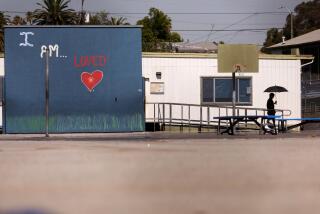Acoustical Society Sounds a Warning on Air Conditioners
- Share via
Almost from the moment Los Angeles voters approved the $2.4-billion school repair bond in April, there has been a steady clamor about “fast-tracking” the installation of air conditioners to relieve the debilitating heat that keeps students from learning.
But as yet there’s been only silence on one potential side effect--the noise caused by all those boxy units stuck into classroom windows or walls.
Now the Acoustical Society of America is weighing in with a warning that the noise can be as harmful to education as the heat.
Citing studies showing that students stop listening when there is too much background noise, the nonprofit professional society for acoustical engineers is hoping to persuade school officials to pay attention to the decibel rating of the equipment that is being installed on about 300 campuses.
Although the most thorough studies have dealt with aircraft noise in schools near flight paths, much anecdotal information suggests that air conditioners present a serious problem too, said society member David Lubman, a noise-control engineer who consults with school districts.
“In areas that use air conditioning . . . it seems to be the most common single source of interior noise,” Lubman said.
Younger students are affected more, he said, because--in part for psychological reasons--hearing difficulties mount when new and challenging material is being discussed. And “if you’re a child just learning to read, everything is new and difficult,” Lubman said.
Currently, there is no national noise threshold standard for classrooms, but the acoustical society is lobbying Washington to adopt one.
A spokesman for the Los Angeles Unified School District said it has received the acoustical society’s proposed guidelines and is reviewing its own classroom design standards to see if change is needed.
“The Acoustical Society has heightened awareness about an issue the district has long been concerned with,” said Erik Nasarenko, spokesman for the district’s facilities division.
The society also is holding a workshop for educators this weekend at the House Ear Institute in Los Angeles. The two-day program covers such technical information as acoustic design regulations, but also has scheduled sessions in which teachers devise solutions to their classroom noise problems.
The engineers say background noise can be mitigated by many methods, such as constructing barriers or substituting sound-absorbing wall coverings. But little can be done to cure a noisy wall air conditioner other than to replace it, they say. And fixing a problem always costs much more than avoiding it during construction.
“Sometimes if you’re going to put in a specification for quiet air conditioning, it may cost a little more,” said society member Jim DuBois, a retired acoustical engineer. “But the advantages of having it are more than worth it.”
More to Read
Sign up for Essential California
The most important California stories and recommendations in your inbox every morning.
You may occasionally receive promotional content from the Los Angeles Times.














